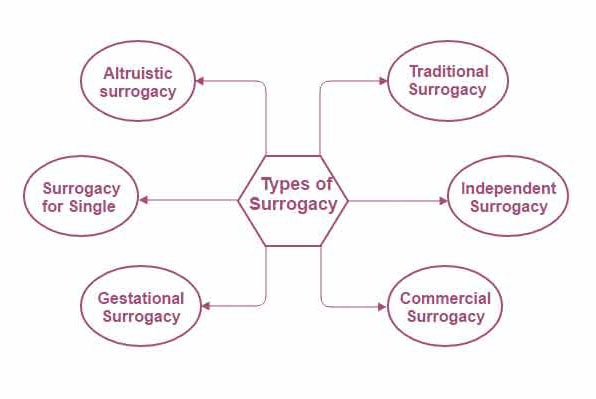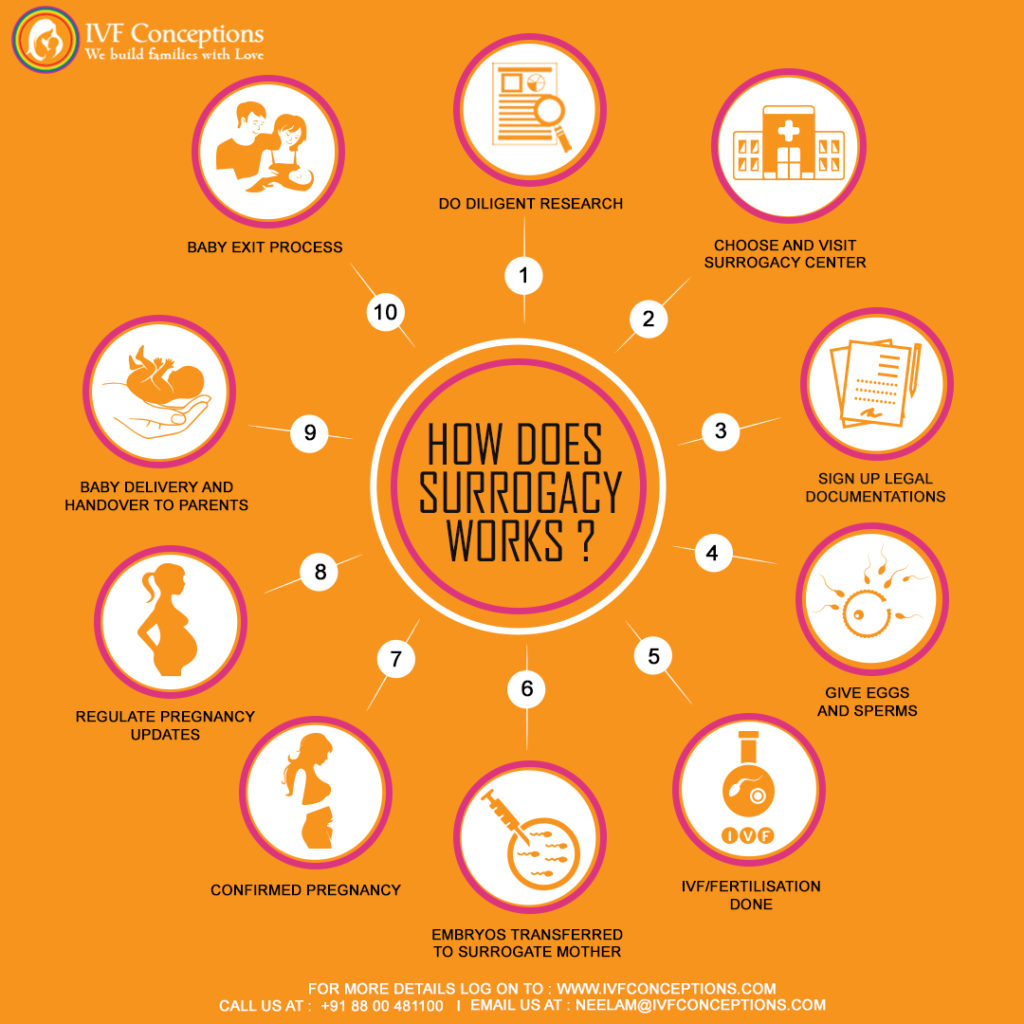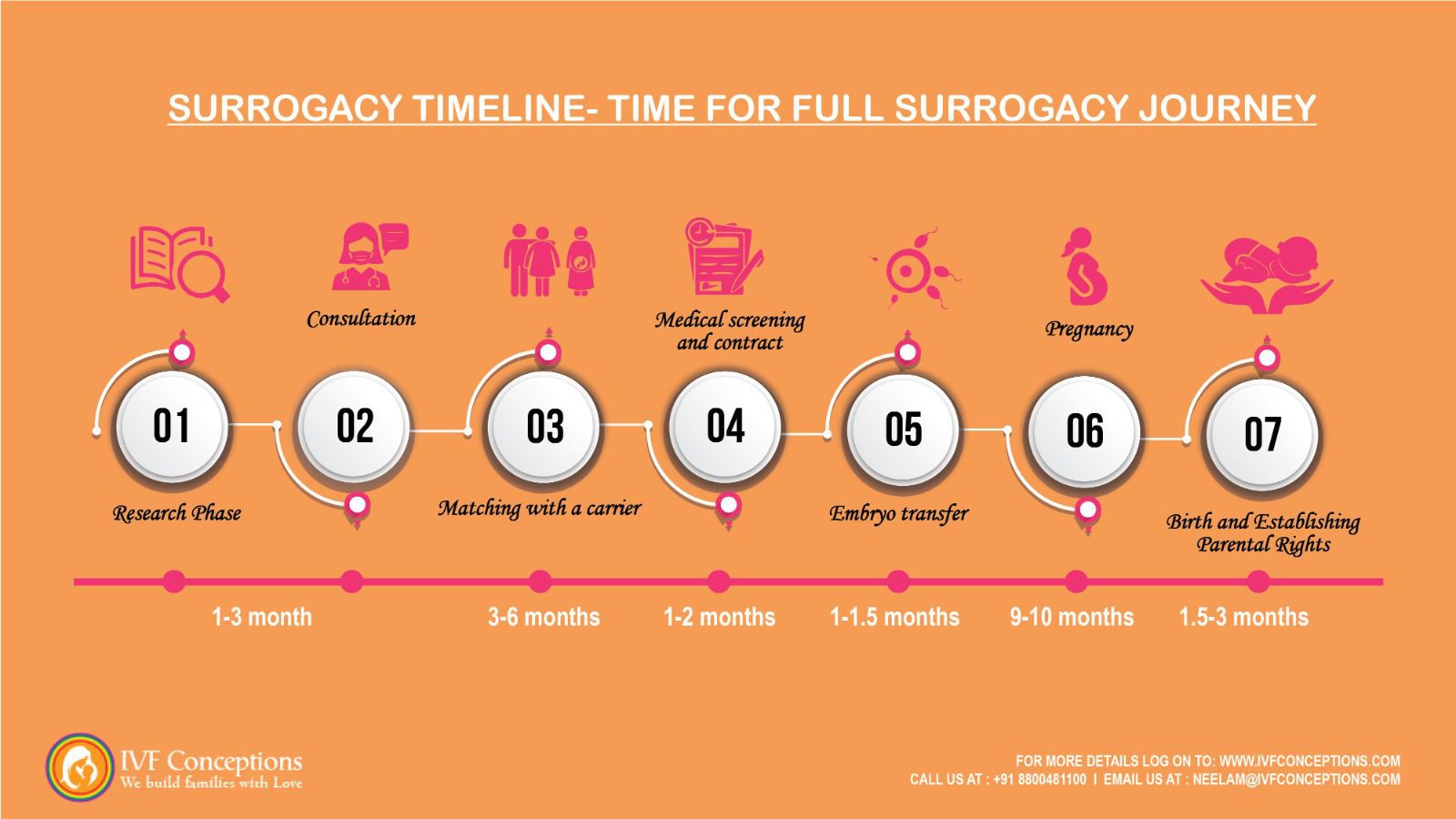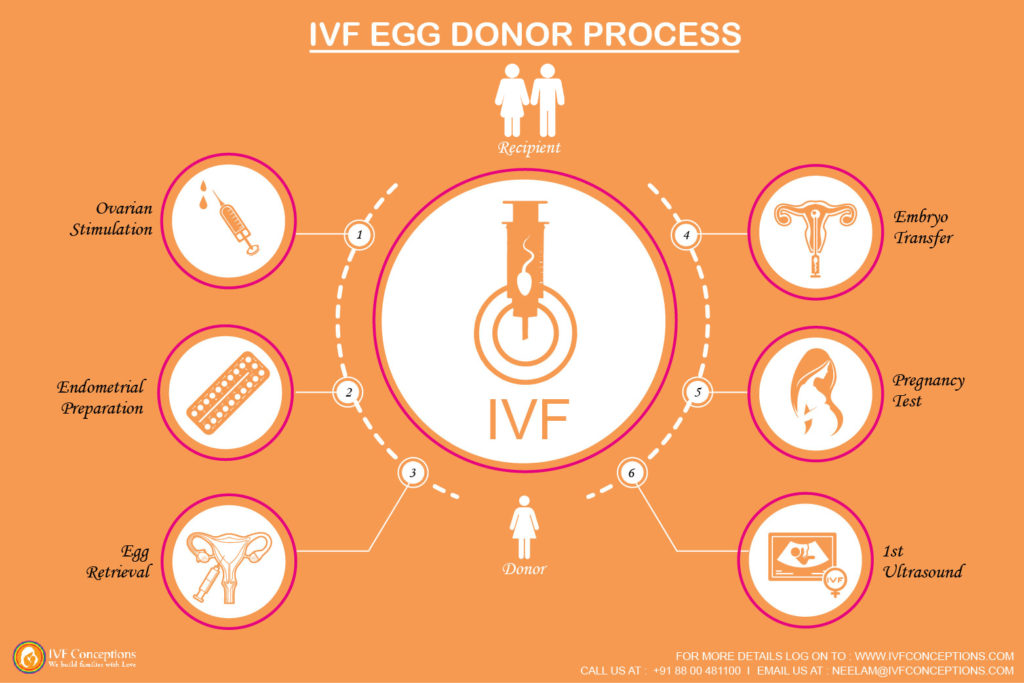Different types of surrogacy services for our lovely couples.

Surrogacy is an arrangement between a woman to carry and deliver a baby/babies for another individual or couple who are unable to conceive. There are different types of surrogacy arrangements as per the specifications of the intended parents and surrogate mothers. To save money and have a hassle-free surrogacy experience, it is good to make an informed decision. In this article, you will learn about different types of surrogacy and what could be the best surrogacy options for you.
The reasons for using a surrogate mother can be;
1. Missing or abnormal uterus in the female partner
2. Multiple failed in-vitro fertilization treatments.
3. Multiple pregnancy losses or due to unexplained medical conditions
4. Chronic health issues in a female partner which make it difficult to carry the pregnancy safely like thyroid, delicate heart conditions, drugs for mental health, high sugar level, etc.
5. For gay couples surrogacy is obvious.
New would-be parents who wish to complete their family via the surrogacy process, have many questions.
- What is surrogacy?
- What is surrogacy meaning/of surrogacy definition?
- Different types of surrogacy?
What is surrogacy?
Surrogacy is an arrangement where a woman ( Known as a surrogate mother) carries and gives birth to the child of another childless couple or single male ( known as intended parents). The legal surrogacy agreement mostly supports surrogacy.
Additional guide for surrogacy
What is a Surrogate Pregnancy: Comprehensive Guide
Surrogacy Escrow Account And FAQ Around It
Pros and Cons of Preimplantation Genetic Screening (PGS)
Signs of Male and Female Infertility
IVF Conceptions is chosen as “The Top 10 Surrogacy Blogs”
Ovarian Rejuvenation Treatment with PRP (Platelet-rich plasma)
Whose Egg is Used in Surrogacy?
Endometriosis and Pregnancy: Can You Get Pregnant With Endometriosis?
Embryo Grading and IVF Success Rates
What Is The Best Age To Get Pregnant?
What is surrogacy meaning/of surrogacy definition?
As mentioned above, surrogacy is a method of Assisted Reproduction Technology (ART) that helps would-be parents to grow their families with the help of a third party. The baby is biologically linked with the couple, however, carried to term and delivered by another woman, known as a gestational carrier. Learn more- about surrogacy’s meaning and definition.
What are the different types of surrogacy?

Being a complicated and lengthy procedure, surrogacy can be completed in several modes and can be adapted to everything from who’ll be genetically related to the child to what type of relationship intended parents and surrogates wish to have with each other.
More resources to read on gestational surrogacy
Gay surrogacy cost-saving tips
FAQ about the surrogacy process
Understanding Critical Surrogacy Contract Terms- Our Top 10 List
What If the Surrogate Wants To Keep The Baby?
Coping with Infertility During the Holidays
Tips For Choosing a Surrogate Home
The different kinds of surrogacy could be overwhelming when you are first learning about it. However, these actually help to ensure that parents and surrogates choose the sort of surrogacy agreement that is perfect for them.
Surrogacy isn’t one size fits all, and a surrogacy professional may help you pick the surrogacy services that are just right for you based on what you desire and expect from the surrogacy process.
For you to get familiar with the various surrogacy types and to help you decide which is one better for you, we have clarified the different surrogacy types below. Hopefully, it will help and guide you in choosing the right surrogacy process for you.
Types of Surrogacy based on Genetic Relationship of Surrogate Mother and Surrogacy Baby: Gestational vs.Traditional Surrogacy.
About creating an embryo, the two main types of surrogacy to consider: are traditional and gestational.
#1. Gestational Surrogacy
In this case, a surrogate mother is the only carrier of the baby but has no genetic link with the baby. Here, gametes of both biological parents are used for fertilization, and resulting embryos are placed in the uterus of the surrogate mother.
Gestational surrogacy is widely used and accepted among the Intended parent. This is because the intended parents feel secure and more in control of the surrogacy pregnancy as they are genetically linked with the baby.
- In gestational surrogacy, the supposed parents create an embryo with their very own egg and sperm or utilize donated sperm or egg.
- Gestational surrogacy is more popular and in trend for the last ten years.
Gestational surrogacy is more practiced due to:
1. It enables both parents of a heterosexual couple to be biologically related to their baby.
2. It helps eliminate a number of the legal and emotional struggles that come with a surrogate being genetically related to the baby she is carrying.
Gestational Surrogacy is the right choice if the commissioning parent.
- When a female partner would like to use her eggs or wish to use an egg donor of their choice.
- In case the intended parents want to be more in control of the surrogacy pregnancy.
- When biological parents are cautious of the legalities and emotional aspects of surrogacy.
#2. Traditional Surrogacy
That is an arrangement where the surrogate mother is genetically linked with the baby, meaning, her gametes are used for fertilization. Most countries ban traditional surrogacy.
Traditional surrogacy is a challenging enterprise for the surrogate mother as she is not only a carrier of the baby but genetically linked as well. It might make it difficult for her to give away the baby to another couple and can be emotionally painful for her.
Therefore, how can you tell which of those kinds that are surrogacy is right for you?
It is always best you consult with your surrogacy professional, but there are several reasons why individuals might choose a traditional or gestational surrogacy for them:
Traditional Surrogacy can be a good option for intended parents:
- When the surrogate is related to one of the intended parents, traditional surrogacy could offer a genetic link that wouldn’t be possible with a donated egg.
- If parents do not want to have an anonymous donor
- Are you looking to cut the surrogacy cost?
- surrogacy without IVF possible, with home insemination kits.
Types of Surrogacy based on payment to the surrogate mother: Commercial surrogacy and Altruistic surrogacy.
Another factor that creates several types of surrogacy options is the compensation in which a surrogate is compensated for carrying the intended parent’s baby.
#1. Commercial Surrogacy
When a surrogate is given a base payment for carrying the fetus, this is called compensated surrogacy.
That is a form of agreement in which a gestational carrier is paid to carry the full child to term in her womb. This kind of arrangement is legal in many countries.
Commercial surrogacy can be an option for the parents when:
- For parents and surrogates who do not know each other before the appropriate procedure.
- Both commissioning parents’ and surrogate mothers’ interests and rights are protected.
#2. Altruistic Surrogacy
If a surrogate doesn’t receive any additional payments for carrying a baby, she’ll complete an altruistic surrogacy. In this surrogacy arrangement, the surrogate mother receives no financial benefit for her pregnancy.
Although, she is eligible to get expenses related to pregnancy care medical fees, clothing allowance, and work-off allowance. Since surrogates are unpaid, altruistic surrogacy could help intended parents reduce their surrogacy costs.
Altruistic surrogacy can be an option for the intended parents:
- If a surrogate state outlaws compensated surrogacy the intended parents may complete their surrogacy altruistically.
- For some parents and surrogates who are buddies or members of the family, compensated surrogacy is pointless; a surrogate will want to carry their infant due to the love between her and the parents.
Types of Surrogacy based on where surrogacy is carried out: Domestic surrogacy or international surrogacy.
#1. Domestic surrogacy
In this type of surrogacy, full surrogacy is carried out locally in the country of the intended parents. The surrogate mother is also based locally, maybe in the same State or a different State.
In countries like the USA, surrogacy is mostly legally allowed in many states. However, due to high surrogacy costs, many couples are forced to opt for international surrogacy.
#2. International Surrogacy
In International surrogacy, the commissioning parents travel outside their country to complete their surrogacy services.
Many nations have strict laws regulating this procedure, so depending upon where you reside, If you live in another country, it is essential that you explore different nations’ laws regarding surrogacy before choosing to pursue a worldwide surrogacy.
There is numerous reason for choosing domestic or international surrogacy:
- Domestic Surrogacy can be a good option if your country allows surrogacy and regulates it correctly.
- It is often more economical and safer to complete.
- This kind of surrogacy allows parents and surrogates to meet, establish a connection, and comfortably remain in contact throughout the entire surrogacy procedure.
- Domestic surrogacy eradicates the legal processes that happen with bringing a baby born overseas back to its parent’s nation.
International Surrogacy can be a good option for those parents:
- who reside in a nation that restricts or outlaws surrogacy.
- They can find and do international surrogacy in a country where surrogacy is legally regulated.
- If surrogacy cost in a cross-border surrogacy program is much less as compared to their country.
- Different types of surrogates are available as per the country you choose as some countries like the surrogate mothers in Georiga and surrogate mothers in Ukraine have good pools of the gestational carrier.
 Selecting the surrogacy process based on carrying out the full surrogacy process with the help of a surrogacy agency.
Selecting the surrogacy process based on carrying out the full surrogacy process with the help of a surrogacy agency.
#1. Agency Surrogacy
When intended parents and surrogate mothers do not know each other before matching, it is quite possible that they work with a trusted surrogacy agency or similar service to safely discover the perfect match.
Agency surrogacy can be a good option for the intended parents:
- For intended parents and surrogates who aren’t comfortable handling and taking charge of all the aspects of their surrogacy, a surrogacy agency or program will take the majority of the responsibility out of their hands.
- The surrogacy cost can be higher as you need to pay a surrogacy agency fee for their assistance.
#2. Independent Surrogacy or Indy surrogacy
Independent surrogacy or also known as Indy surrogacy. Intended parents find surrogacy themselves, (usually a friend or family member), they may feel comfortable without the mediation services offered by a surrogacy agency. Because they will already be matched, they may need a surrogacy lawyer and fertility clinic to handle the legal and medical aspects of the surrogacy.
Independent surrogacy can be an option for couples who:
- For intended parents who are looking to save money on their surrogacy. It is advised to opt for independent surrogacy may be the cheaper option between these two types of surrogacy.
- Someone who already had one or more babies via surrogacy, so they are more or less aware of the process and resources. Such experienced parents might feel confident to do everything themselves.
Types of Surrogacy options based on the type of intended parents.
#1. Single parents surrogacy
In this type of surrogacy service, the intended parent is a single parent. There are few countries that allow only married couples to do surrogacy. That is why you need to consult with your surrogacy agency to know all possible options for you.
#2. LGBT surrogacy
When the intended parents are in same-sex couples, this is known as LGBT surrogacy. Several surrogate mothers preferably like to work with gay couples. As far as gay couple surrogacy is concerned, there are only a few countries that allow gay surrogacy like –Surrogacy in the USA and surrogacy in Colombia.
#3. Hetero couple surrogacy
In this case, intended or commissioning parents are married hetero couples. There are many cost-effective and legal surrogacy destinations for them like surrogacy in Ukraine and surrogacy in Georgia. There are many surrogate options available to them.
IVF- Step-by-Step Guide while doing surrogacy process
Every cycle of IVF involves multiple steps, and each occurs at a specific time during a four to six-week period. The following is an overview of the IVF procedure. The procedure begins in the month proceeding with the actual IVF
cycle. An IVF cycle typically includes the following steps:
Step 1. Suppressing the natural monthly hormone cycle
As a first step of the IVF process, you may be given a drug to suppress your natural cycle. To start this treatment either a daily injection (which is normally self-administered unless you are not able to do this yourself) or a nasal spray is given. This continues for about two weeks.
Fertility Medicines: What All Intended Parents Need To Know
Step 2. Increasing the Egg Numbers
After the natural cycle is suppressed, you are given a fertility hormone called FSH (or Follicle follicle-stimulating hormone). This is usually taken as a daily injection for around 10 to 12 days. This hormone will increase the number of eggs you produce which means you will have more eggs to be fertilized with semen samples and more embryos for implantation. With more fertilized eggs, the clinic has a greater choice of embryos to use in your treatment.
Step 3. Checking on progress
Throughout the drug treatment, the clinic will monitor your progress. This is done by vaginal ultrasound scans and blood tests. Around 34 to 36 hours before your eggs are due to be collected you have a final hormone trigger to help your eggs mature and subsequently get ready for retrieval.
Step 4. Collecting the eggs/semen sample
In the IVF process eggs are usually collected by ultrasound guidance under local anesthesia. This involves a needle being inserted into the scanning probe and into each ovary, facilitating egg pickup. Sometimes cramping and a small amount of vaginal bleeding can occur after the procedure.
Collecting sperm
Around the same time, a female partner is going through egg collections; the male partner is asked to produce a fresh sample of sperm. This is stored for a short time before the sperms are washed and spun at a high speed. This is so the healthiest and most active sperm can be selected. If you are using donated sperm, it is removed from frozen storage, thawed, and prepared in the same way.
Learn more about how to choose an egg donor.
Step 5. Fertilization of eggs with sperms
Your eggs are mixed with your partner or the donor sperm and cultured in the laboratory for 16 to 20 hours. They are then checked to see if any have been fertilized.
Those that have been fertilized (now called embryos) are grown in the laboratory incubator for another one to two days before being checked again. Sometimes fertility specialist decides to go ahead with manually assisted fertilization; this process is known as ICSI. Intracytoplasmic Sperm Injection, or ICSI, is a technique in which a single live sperm is injected into the center of a single human egg.
This technique is developed to help achieve fertilization for couples with severe male factor infertility or couples who have had failure to fertilize in a previous in vitro fertilization attempt. IVF-ICSI could be one of the best options for the couple struggling with male factor infertility, which includes low sperm count, low number of live sperm, or sperm motility and morphology issues.
More resources to read:
How to manage surrogacy costs?
cheapest surrogacy countries in the world
Step 6. Embryo Transfers
After fertilization, the best one or two embryos will then be chosen for transfer and with the help of a thin catheter transferred into the uterus of the female partner or recipient. This process is known as embryo transfer and it is relatively more straightforward and does not require any anesthesia. The number of embryos is restricted because of the risks associated with multiple births. The remaining embryos may be frozen for future IVF attempts if they are suitable. Some clinics may also offer blastocyst transfer, where the fertilized eggs are left to mature for five to six days and then transferred. This is known as Blastocyst transfer.
Step 7. Follow-up after Embryos Transfers
After the embryo transfer, the recipient is asked to take 2 days rest and to avoid any strenuous activities. You need to take progesterone supplements continuously to support the implantation. Following 12 to 14 days of embryo transfer, blood tests are done to confirm the pregnancy.
Step 8. Follow-up for pregnancy or next attempt
In case a successful pregnancy is confirmed through blood tests, continuous support of hormones is given until 10 weeks to 12 weeks and after that, it can be followed by natural pregnancy. In case, the blood test shows no pregnancy, further options are discussed with you. In case you have frozen embryos stored, you can go ahead with frozen embryo transfer (FET) and for those with no frozen embryos, the cycle needs to be repeated. In case you have continuous failed IVF cycles, your doctor can suggest donor IVF for you.
 It goes without saying that your surrogacy process will be as per your unique situation. You are the right person to know what is the best option for you before moving ahead.
It goes without saying that your surrogacy process will be as per your unique situation. You are the right person to know what is the best option for you before moving ahead.
Before shortlisting your surrogacy process, it is good to speak to a reputable surrogacy agency or surrogacy consultant. Knowing options with pros and cons can help you make an informed decision.
Since 2010, we have been assisting the intended parents in their surrogacy journey. We will be happy to guide and support you in your parenthood journey.
If you’d like to learn more about IVF, Egg Donation, or surrogacy services globally, check out the rest of our website at IVF Conceptions. We offer legally secure and affordable surrogacy consulting services for FREE.
More resources for the surrogacy journey:
What is Surrogacy Consultation: Tips For Intended Parents
Can You Become Pregnant after Menopause?
10 Reasons to Become a Surrogate Mother
What Is Ideal Diet And Nutrition For Surrogate Mothers?
What Is Surrogacy Meaning For Parents And Surrogates?
How To Bond With A Newborn After Surrogacy?
What If the Surrogate Wants To Keep The Baby?
What Is Surrogate Pregnancy Mean?
If you’d like to learn more about IVF, Egg Donation, or surrogacy services globally, check out the rest of our website at IVF Conceptions. We offer legally secure and affordable surrogacy consulting services for FREE.
Our team has over 13 years of experience facilitating surrogacy arrangements, egg donation, and serving as an advocacy resource for infertile couples and LGBTQ individuals seeking to build families.
Our founder and chief surrogacy consultant, Neelam Chhagani, passionately helps couples struggling with fertility challenges. Since starting our surrogacy consulting agency in 2013, we’ve helped welcome over 500 babies for intended parents nationwide.
Our team includes experts from diverse backgrounds with leading reproductive attorneys, professionally trained top fertility doctors, former surrogacy case managers, experienced and kind surrogate mother and egg donor coordinators, mental health professionals specializing in infertility counseling, and a logistic support team to assist you in your chosen surrogacy country.





 Selecting the surrogacy process based on carrying out the full surrogacy process with the help of a surrogacy agency.
Selecting the surrogacy process based on carrying out the full surrogacy process with the help of a surrogacy agency.
